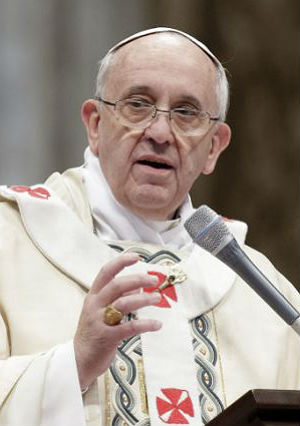Controversy Unveiled: Is Pope Francis Really the Evil Figure Some Portray Him to Be? In a world where opinions are as diverse as the people who hold them, it is unsurprising that religious leaders often find themselves at the center of heated debates. Pope Francis, the current leader of the Roman Catholic Church, has been no exception. Since his election in 2013, he has been both celebrated and criticized for his progressive stance on various social issues.
As with any public figure, interpretations of Pope Francis' actions and words vary widely. For some, he is a beacon of hope, advocating for the marginalized and underserved. For others, his approach to certain topics challenges traditional doctrines, sparking intense debate within the Church and beyond. This article seeks to explore these controversies, offering a balanced perspective on whether Pope Francis truly embodies the negative portrayal attributed to him by some critics.
Pope Francis's Stance on Israel
Pope Francis has faced significant criticism for his perceived criticism of Israel during times of conflict. Critics argue that his statements have taken the Vatican back into a dark past, questioning the diplomatic role of the Church. These remarks have been interpreted as showing favoritism towards one side of the conflict, which has caused unrest among supporters of Israel.
However, it is important to note that Pope Francis consistently advocates for peace and dialogue. His comments are often aimed at encouraging negotiations rather than taking sides. The context of his statements can be crucial in understanding his true intentions, which may not align with the simplistic narratives portrayed by detractors.
Moreover, the Pope's emphasis on humanitarian concerns reflects his broader commitment to global peace. His calls for an end to violence should be seen as part of his mission to promote reconciliation and understanding between conflicting parties worldwide.
The Challenge of Interpreting Papal Words
For many conservative Catholics, Pope Francis’s pronouncements have sparked concern over their alignment with traditional Catholic teachings. Some view his remarks as deviating from established doctrine, leading to accusations of being a false teacher. This perception has created divisions within the Catholic community, as members grapple with reconciling modern values with ancient traditions.
Yet, it is essential to recognize that throughout history, popes have adapted their messages to address contemporary issues. Pope Francis's approach might reflect a shift towards more inclusive language and practices, aiming to engage broader audiences while maintaining core beliefs. His willingness to challenge societal norms could also serve as an opportunity for reflection and growth within the Church.
By embracing new perspectives, Pope Francis encourages dialogue about complex topics such as poverty, inequality, and climate change—issues that resonate deeply with today’s global challenges. Such discussions provide fertile ground for evangelization efforts, allowing the Church to remain relevant in an ever-changing world.
Voting Ethics Under Pope Francis
In the realm of politics, Pope Francis has urged U.S. Catholics to participate actively in elections despite facing difficult choices between candidates. By advising voters to choose “the lesser evil,” he acknowledges the imperfections inherent in democratic systems. This guidance underscores the importance of informed decision-making based on moral principles rather than partisan loyalty.
His advice extends beyond mere political strategy; it emphasizes personal responsibility in shaping society through civic engagement. Encouraging individuals to vote according to conscience reinforces the idea that faith should inform all aspects of life, including political participation. It empowers believers to contribute positively to the common good.
While some may criticize this pragmatic approach, it highlights the practical wisdom needed when navigating complex ethical dilemmas. Pope Francis reminds us that even imperfect options require thoughtful consideration, fostering a culture of discernment among the faithful.
Social Justice and Equality
A cornerstone of Pope Francis's papacy has been his focus on social justice and equality. He frequently addresses issues like economic disparity, asserting that inequality lies at the heart of social evils. Through platforms like X (formerly Twitter), he communicates directly with millions, amplifying his message of compassion and solidarity.
This commitment to addressing systemic injustices resonates strongly with those seeking transformative change. By identifying inequality as a root cause of suffering, Pope Francis calls attention to structural barriers preventing equitable access to resources and opportunities. His advocacy serves as a rallying cry for reform across societies.
Furthermore, his emphasis on inclusivity challenges existing power dynamics, promoting unity amidst diversity. In doing so, Pope Francis exemplifies leadership rooted in empathy and justice—a model sorely needed in our increasingly polarized world.
Beyond Misinterpretations
Despite criticisms labeling him as irresponsible or worse, Pope Francis demonstrates a nuanced understanding of leadership complexities. His tendency to speak candidly sometimes leads to misinterpretations, yet it also reflects authenticity rarely seen in high-profile roles. Rather than adhering strictly to scripted rhetoric, he engages openly with pressing matters affecting humanity.
This openness invites scrutiny but ultimately strengthens transparency. By confronting controversial subjects head-on, Pope Francis models courage and integrity. His ability to adapt communication styles ensures relevance without compromising foundational truths.
In conclusion, while Pope Francis remains a polarizing figure, his contributions toward advancing social justice, fostering interfaith dialogue, and revitalizing the Catholic Church cannot be overlooked. As we continue evaluating his legacy, let us strive for fairness and objectivity, recognizing both achievements and areas requiring improvement.

